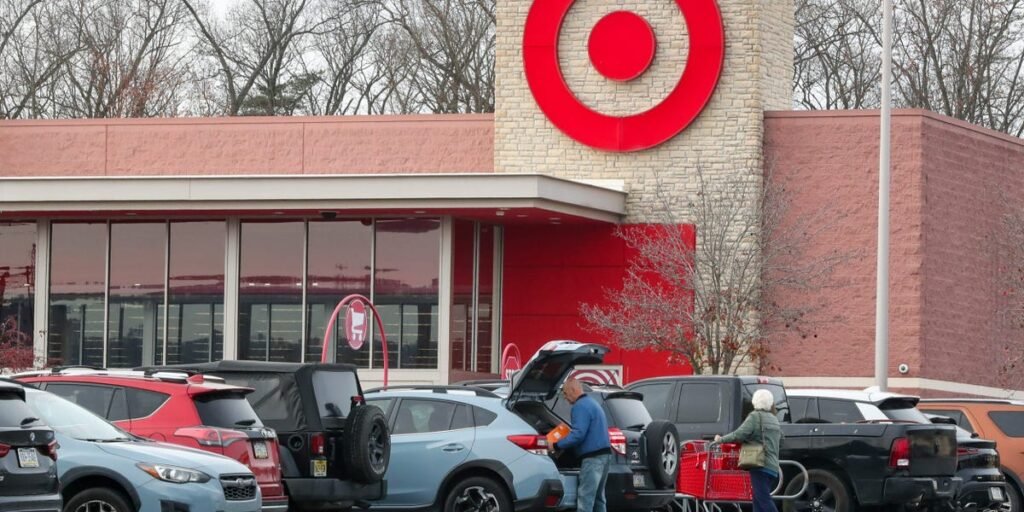- Target’s third-quarter results came up short, with sales growth of 0.3% from last year.
- The company described a shift in consumer spending from “resilient” to “resourceful.”
- Now, they’re waiting “until the last moment of need, focusing on deals, and then stocking up,” CEO Brian Cornell said.
Target has described US households as “resilient” in recent quarters. Now, the retailer is rolling out a new descriptor for shoppers this fall: “resourceful.”
Looking to stretch their budgets just a little farther each month, US consumers are getting more strategic about finding deals and loading their carts when opportunity arises, the company said.
“They’re becoming increasingly resourceful in their shopping behaviors, waiting to buy until the last moment of need, focusing on deals, and then stocking up when they find them,” CEO Brian Cornell said during Target’s third-quarter earnings call.
The Bullseye’s quarterly results came in well short of Wall Street’s expectations, with sales growth of 0.3% from last year, on a store comparable sales decline of 1.9%. Shares of Target stock were down more than 20% as of 2 p.m. in New York.
Chief Commercial Officer Rick Gomez provided additional detail about how this new consumer pattern has played out for the company.
“Our Target Circle week this quarter was one of our biggest yet,” he said. “However, we saw a more pronounced sales dip both the week before and the week after the event, showing just how planful consumers are in seeking out promotions.”
Gomez added that these shoppers used promotions to stock up on “everyday essential” categories.
Unseasonably warm temperatures also meant that shoppers delayed their purchases of cold-weather apparel until they actually needed it, Gomez said. When the mercury finally dropped, the category’s sales jumped by six percentage points.
Target stumbles as Walmart hits its stride
Target’s results arrived against the backdrop of Walmart’s strong earnings, reported a day earlier, which showed both a revenue beat for the retail giant and a positive outlook for the rest of the year.
Walmart shares are up 3% since Monday’s close.
“Target continues to lose customers in categories like household goods to Walmart and other more value-oriented players,” Global Data retail analyst Neil Saunders said in a note. “It remains a kind of top-up destination rather than a place where people come to get meal solutions or do a larger shop. This is a lost opportunity to drive foot traffic, especially in the current consumer environment.”
The shift toward essentials and promotions puts more weight on less profitable lines of business for Target, compared to categories like housewares and other big-ticket items, and it’s not entirely clear if and when the trend will return to historical norms.
“The company’s higher mix of discretionary products and somewhat premium price positioning — at least in the mindset of some consumers — remain headwinds relative to better performance discounters like Walmart,” Fitch Ratings senior director David Silverman said in a note.
And while cash-strapped customers may be holding off on splashy purchases like a new flat-screen TV, they are stopping by the beauty aisles and holiday pop-ups for a little something special to add to their cart of groceries.
“As we look at the discretionary business, what we see is the consumer is willing to shop as long as it’s new, it’s on-trend, and at affordable price,” Gomez, the retailer’s chief commercial officer, said.
Still, analysts on the call questioned whether Target is counting too much on an eventual uptick in general merchandise spending and neglecting to adapt to the current market’s focus on value.
“Would you be willing to trade some of the upside in those areas for even more consistency from quarter to quarter?” UBS analyst Michael Lasser asked.
“Despite some of the macro headwinds we’ve seen — really for eight or nine quarters in discretionary categories — we continue to see a consumer who’s shopping for those seasonal moments,” CEO Cornell responded. “Those are Target moments, and we’re going to make sure we lean in and win.”
Read the full article here

















